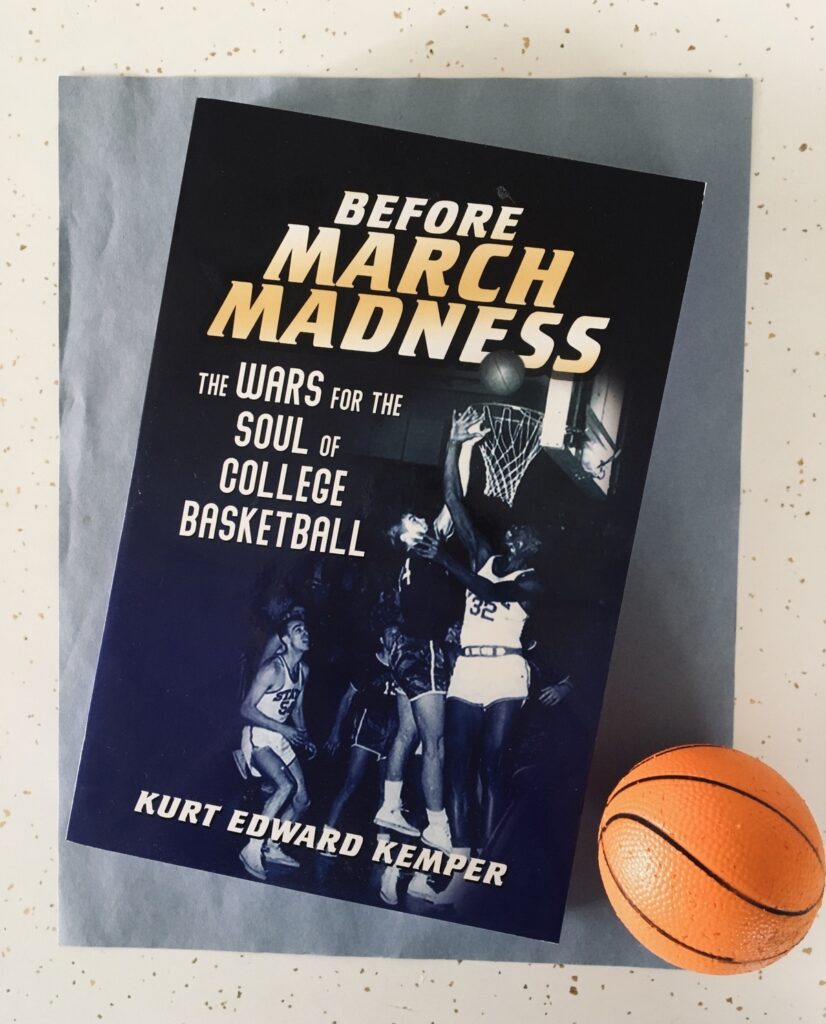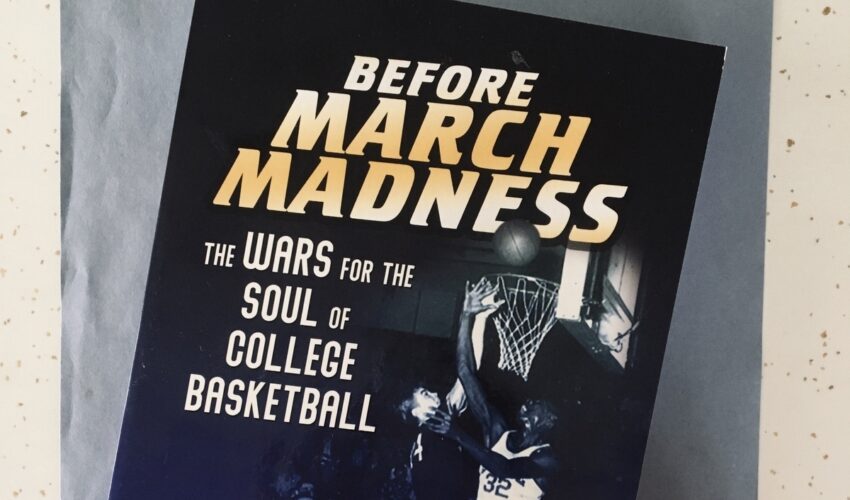Award-winning DSU author publishes book: ‘Before March Madness: The Wars for the Soul of College Basketball’
June 11, 2021
This paid piece is sponsored by Dakota State University
As a professor of history and director of the General Beadle Honors Program at Dakota State University, Kurt Kemper has engaged in his share of extensive research.
For the past 10 years, the California native spent free time between committee work, teaching and travel to write his recently published book, “Before March Madness: The Wars for the Soul of College Basketball.”
The book, which was released in August 2020, focuses on the tribulations of college basketball and how they influence college sports today. It also gives readers an insight into competing factions, detailing why historically black colleges and regional schools came to embrace commercialization.
Kemper sat down with us for an exclusive look at his book and the world of college basketball as it relates to higher education.
Tell us about your book, “Before March Madness: The Wars for the Soul of College Basketball.”
I started writing with an intent of something different – looking at how small colleges were affected by the gambling scandals in the 1950s when gamblers convinced players at multiple schools to shave points to fix the betting line but without throwing games outright.
In the process of researching this, I started looking at the forces that created what is now Division II college basketball and their tournaments. I found that every time I looked at something, it led me to something more that went further back in history.
I ended up with three multiple strands:
- Reform efforts to transform college basketball away from a commercialized entity by smaller liberal arts colleges.
- The desire for equity and inclusion by historically black colleges.
- The desire for equal competition by smaller schools that weren’t good enough to compete with big powers in college basketball but still wanted to play tournaments and have championship experiences.
All these elements for a time threatened the National Collegiate Athletic Association but eventually led to a smaller tournament that preserved and protected the NCAA – giving big-time commercial powers greater control over college sports.
What relevance does your book have with higher education?
The biggest relevance is that rather than lead to significant reform in college sports or move them away from a commercial model, the crises in the ’50s solidified the commercialized model and the power of the big-time schools.
The overall presumption is that there is money to be made in college sports and the only way to do that is to win games. This causes schools to make decisions based NOT on the educational experience, intellectual development and all other pieces that organized sports provide but instead on how to get the best players and teams that will lead to victory and commercial profit. What we end up with in the current state of higher education is the assumption that college athletics are privileged and cannot be challenged in certain ways because they bring in money and popular attention. Athletics is also a pathway for many people who may not otherwise have a connection to a university or college.
Now, it seems as though higher education can’t function without it, so it’s a key moment at which the role of athletics is cemented as a fundamental auxiliary component to higher education in the United States.
You’re a professor of history, how do sports and history go hand in hand?
Sports, like so many other aspects of leisure and recreation, are a form of culture. I consider myself a cultural historian, so in that regard, it conveys values and messages of the society that consumes and practices it.
What I’m interested in is not so much the outcomes of the games, but the way in which games are played and organizations administer them, how they situate themselves in a larger cultural setting and what their prominence means. It’s about looking at values and cultural forms and what it says about the people who participate and consume them.
You’ve also published a book about college football, “College Football and American Culture in the Cold War Era (Sport and Society),” tell us about that.
In this book, I explore the increasing investment of American national ideals in the presentation and interpretation of college football during the Cold War, offering a new contribution to the understanding of Americans’ assumptions and uncertainties regarding the period.
Americans utilized football as a cultural mechanism to magnify American distinctiveness in the face of Soviet gains, and they positioned the game as a cultural force that embodied toughness, discipline, self-deprivation and other values deemed crucial to confront the Soviet challenge. They also applied the game in broad strokes to define an American way of life. They debated and interpreted issues such as segregation, free speech and the role of the academy in the Cold War though the lens of college football.
Do you have any other books published? Where can your books be purchased?
I have a textbook that came out this year, a survey text on American sports history in the United States. It’s aimed at the high school level and is assigned this coming year for the first time in the Sioux Falls School District.
My textbook is online but only available through contract. My other books are available on Amazon, Barnes & Noble, etc. The University of Illinois Press publishes both of them as well.
You recently received the Merrill Hunter Award for Excellence in Research, tell us about that award.
Every year, the Office of the Provost coordinates four awards for DSU faculty to acknowledge their excellent contributions in research and teaching activities at Dakota State.
The Merrill Hunter Award for Excellence in Research is sponsored by the Hunter family in honor of their father, Merrill. Merrill was a long-time South Dakota newspaper publisher and owned the Madison Daily Leader, one of the last independent daily newspapers in the state. He was a World War II and Korean War veteran, active in the community and was serving as president of the DSU Foundation at the time of his death in 1990.
What does it mean to be honored with this award?
It’s always nice to be recognized by your peers. I deeply appreciate being nominated by my peers here at DSU, who recognize the research that I’ve conducted and put forth, so that’s very nice. It’s also wonderful that the university creates a mechanism for excellence in research and teaching and all the other areas in which faculty members can be recognized. I’m very appreciative of that.
Dakota State’s faculty award winners for the 2020-21 academic year include: Dr. Kurt Kemper (back left), Dr. Tom Halverson; Dr. Kevin Smith (front left) and Kindra Schneider.
Tell us about the research you conducted that aligns with this award.
Well, the award doesn’t have any specific criteria, so the review committee chooses to define excellence in their own fashion. The primary research I did involves archives all over the United States. It was an extensive primary-source research process, as well as relying on relevant secondary sources. My bibliography runs about 10 to 15 pages, so there was a tremendous depth of research that went into this book. Then also, writing about something that is both timely and significant is something I think the committee took into account. This really is a seminal moment in the evolution of college athletics with the context of higher education as both a question of athletics reform as well as equality.
You’re the director of the General Beadle Honors Program at Dakota State. Tell us about how your research and writing set an example for your Honors students.
University publication allows faculty members to appear to the students as more than simply teachers. It illustrates that they are experts in their field and that they’re intellectuals who wrestle with the problems of society and its systemic structures. It helps elevate the role of the university as a distinctly different phenomena from the K-12 system for many students.
It also allows me to bounce off of and articulate ideas to some of the brightest and most accelerated thinkers on campus. I’ve run things by them, have had them read things that I’ve written in smaller snippets, and they provide great feedback.
The best teachers are always good students. I’ve learned from what my students have had to say, write and think. In that regard, it’s been very beneficial.










